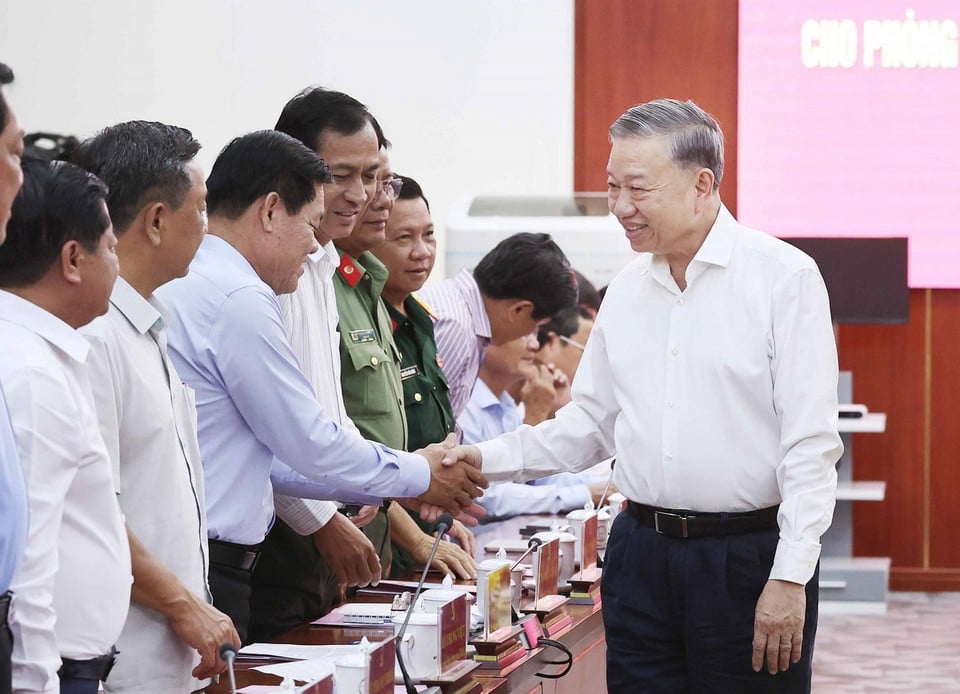
Ho Chi Minh's thoughts on Party personnel work
Our Party and beloved President Ho Chi Minh paid special attention to cadre work. He said: "Cadres are the root of all work" (1) , "The success or failure of work depends on good or bad cadres" (2) ; Resolution No. 26-NQ/TW, dated May 19, 2018, of the 12th Central Executive Committee, "On focusing on building a contingent of cadres at all levels, especially at the strategic level, with sufficient qualities, capacity and prestige, equal to the task", clearly defined the viewpoint: Cadres are the decisive factor in the success or failure of the revolution; cadre work is the "key" link in the work of building the Party and the political system. Building a contingent of cadres, especially strategic cadres, is a top priority task, a crucial task of the Party, which must be carried out regularly, carefully, scientifically, closely and effectively. The 13th Party Congress document continues to affirm: "Focus on building a team of cadres at all levels, especially at the strategic level and leaders" (3) .
Recently, our Party and State have issued many important documents on personnel work (4) . Accordingly, the dissemination and implementation of resolutions and regulations of the Central Executive Committee, the Politburo, and the Secretariat have been ensured seriously and consistently, so the Party's personnel work has been carried out in a disciplined manner from the Central to the local levels. The Party's cadres have grown more and more mature, and many cadres have made important contributions to the leadership, direction, administration, and implementation of political tasks at all levels, sectors, agencies, and units. The Central Executive Committee, the Politburo, and the Secretariat, headed by the General Secretary, have resolutely directed the implementation of the goals and targets of the Party's congresses of each term. The investigation, prosecution, trial, inspection, auditing and auditing agencies have mastered their expertise and skills, and have made many important contributions in participating in assessing the qualities and capacities of the staff, through the fight against corruption, waste and negativity, contributing to strengthening the people's trust in the Party and the State.
However, in reality, there are still some cadres with limited qualities and abilities, but who want to develop to higher positions, so they seek to run for degrees, run for planning, run for promotion, and appointment against the regulations of the Party and the State. Some cadres with positions and authority seek to introduce, promote, and appoint relatives, family members, "backyards",... to positions that do not meet the standards. Some cadres, after being promoted and appointed, soon degraded in quality, ethics, lifestyle, embezzled, corrupted, wasteful, caused loss of the state budget and assets, and had to receive strict punishment from the Party and the State; among them, there are also a few senior cadres who have undermined the people's trust in the Party, the State, and the regime.
The above limitations and negative aspects of personnel work have a number of causes as follows:
Firstly, some Party committees, agencies, departments and branches have not focused on studying, learning and thoroughly grasping the contents of the Party's resolutions and regulations, and the State's policies and laws on personnel work, so they have not changed the awareness of each cadre, Party member and civil servant and helped people understand and implement them.
Second, some Party committees, especially heads of departments, branches, localities and units have not fulfilled their responsibilities in personnel work, especially not respecting the principle of democratic centralism, and in some cases, there have been signs of authoritarianism and authoritarianism in the planning, rotation, promotion and appointment of cadres.
Third, correctly evaluating cadres is a very difficult step, but apart from the general standards for cadres, there are no clear regulations on standards and evaluation criteria for each position of leadership and management cadres, especially heads of Party committees and authorities at all levels and in all sectors.
Fourth, the people are very interested in building the Party's cadre team in the political system, but currently there is no truly effective mechanism for the people to participate in, introduce and recommend truly virtuous and talented people to the Party and State, as well as periodically collect the people's satisfaction and trust index for the heads of Party committees and authorities at all levels.
Fifth, although Party documents have clearly stipulated the inspection, supervision, and control of power in personnel work and the fight against the abuse of power and positions, while many functional agencies have done well, in some places the implementation is still poor, with low effectiveness and efficiency.
Sixth, personnel work is very important and is carried out through specific people, but Party and State documents do not have full and strict regulations on the authority and responsibility of organizations and individuals in advising, introducing, nominating and arranging personnel, especially in cases where officials are not truly virtuous or talented, but are still promoted and appointed, damaging the prestige and reputation of the Party and State.
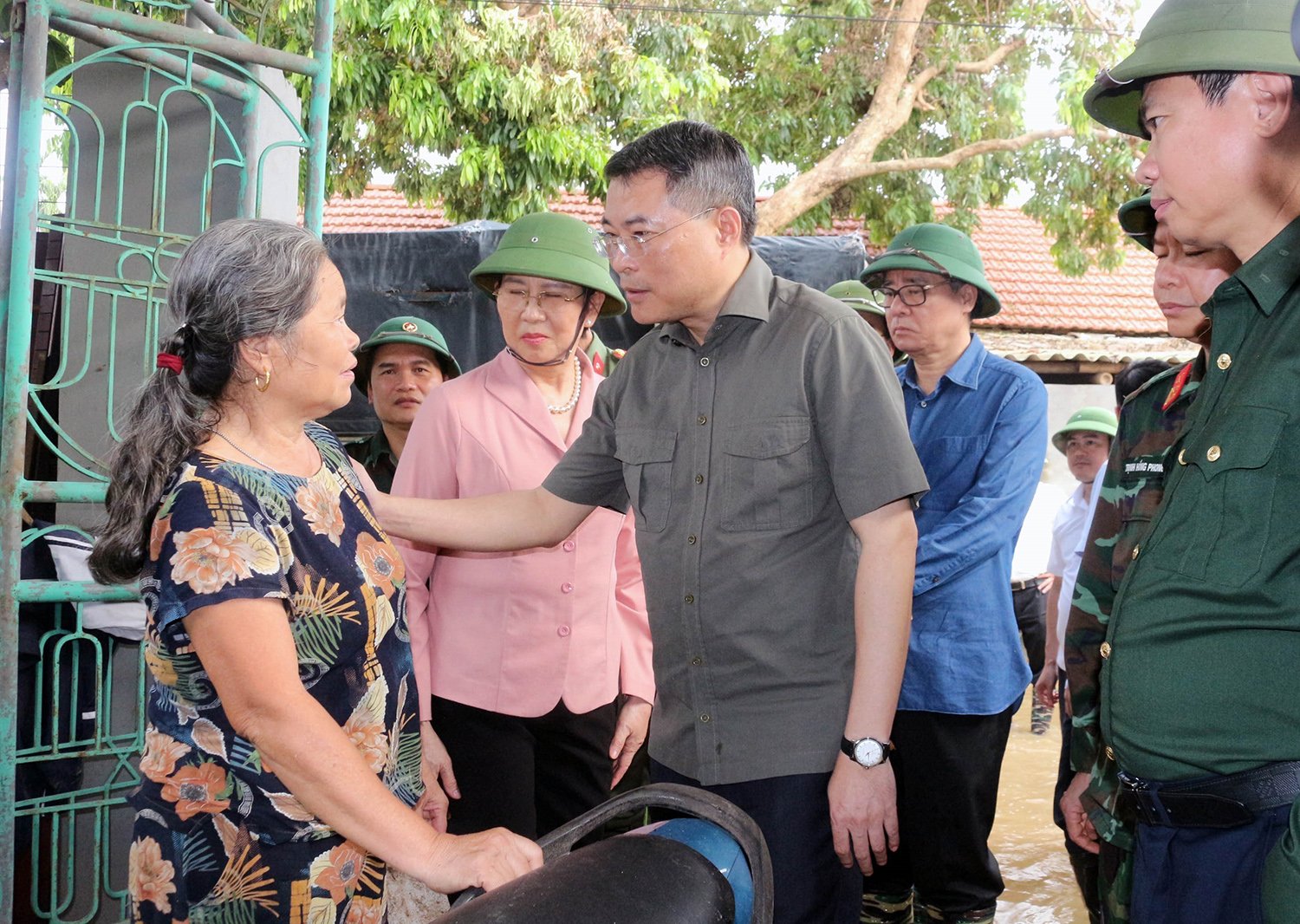
Some issues need to be studied and experiences drawn to continue to do better in personnel work in the new situation.
The Resolution of the 13th National Party Congress affirmed: “Strengthening Party building and rectification, promoting the Party's working class nature, improving the Party's leadership capacity, governing capacity and fighting strength; building a clean and strong Party and political system in all aspects, building a streamlined State that operates effectively and efficiently; associated with streamlining the payroll, improving the quality and restructuring the contingent of cadres, civil servants and public employees; building a contingent of cadres and Party members, especially a contingent of strategic-level cadres and leaders with sufficient qualities, capacity and prestige, equal to the task, and close to the people are factors that are decisive to the success of the cause of national construction, development and defense of the Fatherland” (5) , which needs to be widely implemented throughout the Party and the political system. To organize the implementation of the above viewpoint, there must be many synchronous solutions, in particular, the work of cadres needs to pay attention to studying and summarizing experiences on a number of issues as follows:
Firstly, continue to promote the people's role as masters, rely on the people to build a contingent of cadres at all levels, especially strategic-level cadres and heads of Party committees and governments at all levels and in all sectors.
Consistently implementing the Party's viewpoint that "People are the root", affirming the role of the subject and the central position of the people in the country's development strategy, in the entire process of building and defending the Fatherland and the motto "People know, people discuss, people do, people inspect, people supervise, people benefit", the Party Committee must promote the people's mastery, rely on the people to build a contingent of cadres. To create all conditions for the people to actively and effectively participate in cadre work, there must be specific mechanisms and documents to introduce and recommend truly virtuous and talented people to the Party; inspect and supervise cadres on "things that Party members are not allowed to do", on the responsibility to set an example, especially for strategic-level cadres and heads of Party committees and authorities at all levels and in all sectors. The Party and the State need to have a mechanism to protect the people in reporting and denouncing cadres who violate regulations on cadre work; At the same time, strictly handle those who take advantage of democracy to incite and divide the great national unity bloc and make false accusations.
Second, continue to innovate and streamline the Party apparatus and political system to be lean, effective and efficient, associated with streamlining the payroll and improving salary policies so that cadres can better perform their assigned political duties and tasks.
The documents of the 13th National Party Congress determined: "Continue to perfect the organizational model of the political system; more clearly define the functions, tasks and operating mechanisms of organizations in the political system..." (6) , "Promote the implementation of streamlining the payroll associated with restructuring the contingent of cadres, civil servants and public employees according to positions and jobs" (7) . In the new period, science and technology have developed rapidly, especially information technology,... allowing the Party and the State to streamline the organization and intermediate apparatus at the provincial and district levels, general departments, bureaus, offices and institutes in ministries and branches. For the Vietnam Fatherland Front system and socio-political organizations, it is necessary to strengthen the team of research and practice summary cadres at the central level to both advise the Party and act as the core to mobilize and effectively gather organizations, contingents of union members and association members nationwide; At the same time, build a strong team of grassroots cadres, directly propagandize, act as the core, mobilize, gather, and unite members to implement the Party's guidelines and policies, the State's policies and laws, and political tasks at the grassroots level. For advisory agencies for Party committees, it is necessary to strengthen the team of cadres with the capacity to research theory and summarize practice to effectively advise Party committees; at the same time, streamline administrative and service staff. On that basis, promptly improve salary policies accordingly so that cadres, civil servants, and public employees can work with peace of mind.
Third, continue to do a good job of evaluating staff.
Evaluating cadres has always been a difficult task. There are intelligent, dynamic cadres who dare to think and act for the common good, but in a place where internal solidarity is lacking, especially when the leader is not truly virtuous or talented, it is very difficult for the cadres to develop their abilities; on the contrary, there are cadres who work in a very good working environment, but do not voluntarily strive and practice, so it is difficult for them to mature. In fact, measuring people's hearts is the most difficult, there are people who speak well, but do not act well, say one thing but do another, say but do not do... Nguyen Trai - a wise man of the Le Dynasty had to exclaim: Fish know the depth of the water/ The height of the mountain is like a cloud wall/ The tree is soft and weak, the wind is good/ Oh, how difficult it is for people's hearts .
The documents of the 13th National Party Congress clearly state: "Taking work results, satisfaction and trust of the people as important criteria to evaluate the quality of the apparatus organization and the quality of cadres and party members" (8) , "Taking importance to evaluating quality, efficiency, and actual products according to assigned duties and tasks and promoting the responsibility of the leader" (9) . The Politburo has issued a document evaluating cadres, but it is necessary to specify criteria for a number of important positions, which will contribute to enhancing the responsibility of those cadres before the people and the country. Because the number and structure of cadres in the political system is very large, it is recommended that priority be given to early regulation of criteria for evaluating the positions: Minister, head of ministerial-level agency, secretary, chairman of the People's Committee at the provincial, city, district, commune, and ward levels. These positions work directly or indirectly with the legitimate rights and interests of the people every day, so they are closely monitored and evaluated by the people. Along with regulations and evaluation criteria, it is necessary to stipulate both rights and responsibilities so that the heads of sectors, heads of Party committees and authorities can promote their roles. Annually, there are regulations to collect the satisfaction and trust index of cadres, civil servants, public employees, workers in the sector and people nationwide for ministers, and to collect the satisfaction and trust index of people of all walks of life in the locality for the leaders at each level. After receiving the assessment of the collective Party committees at higher levels, it is necessary to widely publicize it on the mass media for the people to know. This is a very important measure, contributing to making the movement nationwide change for the better; At the same time, it requires leaders to select and introduce their subordinates more practically, not allowing the situation of officials running for positions, power, and weak capacity to enter the state apparatus.
The criteria for evaluating a minister must be based on the results and effectiveness of directing and implementing the state management functions and tasks of the sector, on the satisfaction index and trust of cadres, civil servants, public employees, and workers in the sector, and on the satisfaction index of the people nationwide.
The evaluation of a comrade who is the head of a local Party Committee or government is mainly based on whether the material and spiritual life of the people in that locality has improved compared to before, the results of the annual and term-wide socio-economic, defense and security targets, and whether the satisfaction and trust index of the people is high or low. If we only rely on the year-end and term-end review votes conducted by the Party Committee, it is difficult to ensure substance, because some places do it seriously, while others do it in a formalistic manner.
Objectively evaluating the "industry commanders" and heads of local Party committees and authorities is the basis for creating a source of cadres for strategic-level cadres,... Before assigning cadres to important positions in the country, it is necessary to evaluate the results and practical performance of that cadre throughout the entire working process, only then can we minimize the cases of not really having enough virtue and talent to be a leader of the Party and State.
Fourth, do a good job of planning and promoting and appointing truly virtuous and talented cadres.
The current cadre planning is directed by the Politburo and the Secretariat according to regulations that are both quite strict and proactive in creating a source of cadres for the Party Committee before promoting, appointing and preparing personnel for the Party Congresses at all levels for the new term. However, the current planning method still somewhat misses a part of the country's talents, because it has not promoted well the role of the people as masters in building the cadre team. Before building the cadre planning, the Party Committee should widely disseminate the purpose, requirements, and cadre standards to the people and have a mechanism to encourage the people to participate in introducing and recommending truly virtuous and talented people to the Party Committee. On the basis of synthesizing the results of introductions and recommendations of the people, the competent agency on cadre organization will study, consider, and advise the Party Committee to select and decide. In order to have a more effective strategic cadre team, it is recommended that the planning work must create a source of cadres early and from afar. For example, creating a source of ministers, especially in specific sectors such as education, health, etc., each term, the Central Committee should select young, outstandingly capable, good-natured and flexible social talents to send to the grassroots to do sector management work. Relevant departments will monitor and evaluate those factors through practical leadership and management activities at the district and provincial levels to select one or a few people with the most potential and best qualities to arrange to be deputy ministers for a period of time before becoming ministers. With that approach, we are confident that after two terms, we will have suitable and stable personnel.
Regarding the promotion and appointment of cadres, the Central Committee has strict regulations, but it is necessary to continue to promote the responsibility of the staff agency regarding cadres. The arrangement of cadres must continue to follow the instructions of beloved President Ho Chi Minh: "Only by clearly knowing the cadres can we properly promote them" (10) , "When promoting a cadre, it is necessary to clearly consider whether that person is close to the masses, whether they are trusted and admired by the masses. It is also necessary to consider what the person is suitable for. If a talented person is not used properly, the job will not be done" (11) . Practical experience has clearly demonstrated that one of the qualities of a leader and manager is "having the talent to use talented people". President Ho Chi Minh gave very profound instructions to leaders and managers: “If you have the right to use people, you must use talented people who can do the job. Don’t drag them into this or that position just because you have relatives and friends. Don’t suppress those who are more talented than you because you are afraid of losing your position” (12) .
To continue to carry out the work of planning and promoting and appointing the right cadres according to Ho Chi Minh's ideology and the regulations of the Central Committee, the competent agencies on cadre organization need to survey and evaluate objectively and effectively the arrangement of cadres in cases such as arranging heads of sectors, but not yet trained in that field; arranging cadres who have not had practical experience in Party building work, but are elected to the Party Committee and then appointed to work as Party Committee Secretaries; arranging cadres who have never done state management work, but are recommended to be elected as People's Committee Chairmen or arranging a number of general directors and directors of enterprises after being elected to the Party Committee, then appointed to work as Party Committee Secretaries in Party Committees with many Party members, etc.
If we survey and evaluate objectively and closely, the results and effectiveness of the leadership, direction and management of leaders and managers in practice will certainly draw many valuable lessons for the Party's personnel work. In fact, there are cadres who, thanks to their experience learning from the people, comrades and colleagues, have still matured quickly and completed their assigned tasks well.
Fifth, further strengthen the control of power in personnel work.
In order to effectively control power in personnel work, Party committees at all levels must lead leaders at all levels and sectors to thoroughly grasp and strictly implement the regulations of the Politburo during the implementation process (13) . On that basis, Party committees at all levels need to develop annual programs and plans for supervision of recruitment, reception, planning, training, rotation, promotion, appointment, reward, and discipline of cadres, especially cadres under the management of the Politburo, the Secretariat, and Party committees. In the current situation, it is necessary to promote the role of the people in supervising organizations in the political system on personnel work. Party committees at all levels should designate a specific agency and address so that each citizen can promptly reflect and provide information about violations in personnel work to that agency and address. On the basis of receiving and synthesizing information, report and submit to competent authorities for resolution and handling (if any). Thanks to the people's feedback, some Party committees have accepted and withdrawn the decision to appoint and promote some officials who do not meet the standards and procedures, which has been agreed and supported by public opinion. To contribute to more effective control of power in personnel work, it is necessary to study regulations on the responsibilities of organizations and individuals when directly recommending to the Party committees to promote and appoint people who are not truly virtuous or talented, violate the law, and must receive disciplinary action from the Party and the State.
Practice shows that wherever Party committees, authorities and people do a good job of supervising and controlling power in personnel work, that place contributes to political stability, internal solidarity and unity, and the relationship between the Party and the people becomes increasingly closer and more solid./.
-----------------
(1) Ho Chi Minh: Complete Works, National Political Publishing House Truth, Hanoi, 2011, vol. 5, p. 309
(2) Ho Chi Minh: Complete Works, op. cit., vol. 5, p. 313
(3) Documents of the 13th National Congress of Delegates, National Political Publishing House Truth, Hanoi, 2021, vol. II, p. 242
(4) Regarding the resolution: The Politburo issued Resolution No. 42-NQ/TW, dated November 30, 2004, "On the planning of leadership and management staff during the period of accelerating industrialization and modernization of the country"; Resolution No. 04-NQ/TW, dated October 30, 2016, the 4th Conference of the 12th Party Central Committee, "On strengthening Party building and rectification; preventing and repelling the degradation of political ideology, ethics, lifestyle, and manifestations of "self-evolution" and "self-transformation" within the Party"; Resolution No. 26-NQ/TW, dated May 19, 2018, the 7th Conference of the 12th Party Central Committee, "On focusing on building a contingent of cadres at all levels, especially at the strategic level, with sufficient qualities, capacity and prestige, equal to the tasks".
Regarding regulations: The Politburo issued Regulation No. 211-QD/TW, dated November 8, 2013, "On the supervision of Party members who are cadres under the management of the Politburo and the Secretariat", in which Article 7 contains the content of supervising the implementation of Party and State regulations on organizational work, cadres, and things that Party members, cadres, and civil servants are not allowed to do; Regulation No. 262-QD/TW, dated October 8, 2014, of the Politburo, "On taking a vote of confidence for leading members of Party committees and leading cadres in Party, State, Fatherland Front, and socio-political organizations"; Regulation No. 86-QD/TW, dated June 1, 2017, of the Politburo, on "Supervision within the Party"; Regulation No. 98-QD/TW, dated October 7, 2017, of the Politburo, “On cadre rotation”; Regulation No. 132-QD/TW, dated March 8, 2018, of the Politburo, “On annual review, assessment and classification of quality for collectives and individuals in the political system”; Regulation No. 07-QD/TW, dated August 28, 2018, of the Politburo, on “Disciplinary action against violating party organizations”, in which Article 2 stipulates violations in organizational work, cadres and party members; Decision No. 99-QD/TW, dated October 3, 2017, of the Secretariat, “Issuing framework guidelines for party committees and party organizations directly under the Central Committee to continue promoting the role of the people in the fight to prevent and repel degradation, “self-evolution”, and “self-transformation” within the Party”; Regulation No. 08-QDi/TW, dated October 25, 2018, of the Central Executive Committee, on “Responsibility to set an example for cadres and party members, first of all Politburo members, Secretariat members, and Central Executive Committee members”; Regulation No. 179-QD/TW, dated February 25, 2019, of the Politburo, “On the inspection and supervision regime of cadre work”; Regulation No. 205-QD/TW, dated September 23, 2019, of the Politburo, “On controlling power in cadre work and combating the practice of buying and selling positions and power”; Regulation No. 214-QD/TW, dated January 2, 2020, of the Politburo, on “Framework of standards for titles and criteria for evaluating cadres under the management of the Central Executive Committee, the Politburo, and the Secretariat”; Regulation No. 41-QD/TW, dated November 3, 2021, of the Politburo, “On dismissal and resignation of cadres”; Regulation No. 50-QD/TW, dated December 27, 2021, of the Politburo, “On cadre planning”; Regulation No. 22-QD/TW, dated July 28, 2021, of the Central Executive Committee, “On inspection, supervision and discipline enforcement of the Party”; Regulation No. 80-QD/TW, dated August 18, 2022, of the Politburo, “On decentralization of cadre management and appointment and introduction of cadres for election”; Regulation No. 124-QD/TW, dated October 4, 2023, of the Politburo, “On annual review, assessment and classification of quality for collectives and individuals in the political system”.
(5) Documents of the 13th National Congress of Delegates, op. cit., vol. II, p. 325
(6), (7) Documents of the 13th National Congress of Delegates, op. cit., vol. II, pp. 239, 240
(8) Documents of the 13th National Congress of Delegates, op. cit., vol. I, p. 192
(9) Documents of the 13th National Congress of Delegates, op. cit., vol. II, p. 242
(10), (11) Ho Chi Minh: Complete Works, op. cit., vol. 5, pp. 321, 314
(12) Ho Chi Minh: Complete Works, op. cit., vol. 5, p. 123
(13) Such as: Regulation No. 205-QD/TW, dated September 23, 2019, of the Politburo, "On controlling power in personnel work and combating the abuse of power and positions"; Regulation No. 86-QD/TW, dated June 1, 2017, of the Politburo, on "Supervision within the Party"; Regulation No. 211-QD/TW, dated November 8, 2013, of the Politburo, "On supervision of Party members who are cadres under the management of the Politburo and the Secretariat".
Source: https://tapchicongsan.org.vn/web/guest/chinh-tri-xay-dung-dang/-/2018/1075602/mot-so-suy-nghi-ve-cong-tac-can-bo-cua-dang-trong-tinh-hinh-moi.aspx


![[Photo] Chinese, Lao, and Cambodian troops participate in the parade to celebrate the 50th anniversary of the Liberation of the South and National Reunification Day](https://vphoto.vietnam.vn/thumb/1200x675/vietnam/resource/IMAGE/2025/4/30/30d2204b414549cfb5dc784544a72dee)

![[Photo] The parade took to the streets, walking among the arms of tens of thousands of people.](https://vphoto.vietnam.vn/thumb/1200x675/vietnam/resource/IMAGE/2025/4/30/180ec64521094c87bdb5a983ff1a30a4)


![[Photo] Cultural, sports and media bloc at the 50th Anniversary of Southern Liberation and National Reunification Day](https://vphoto.vietnam.vn/thumb/1200x675/vietnam/resource/IMAGE/2025/4/30/8a22f876e8d24890be2ae3d88c9b201c)











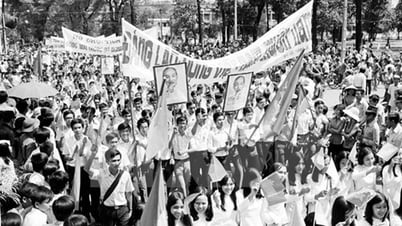
![[Photo] Performance of the Air Force Squadron at the 50th Anniversary of the Liberation of the South and National Reunification Day](https://vphoto.vietnam.vn/thumb/1200x675/vietnam/resource/IMAGE/2025/4/30/cb781ed625fc4774bb82982d31bead1e)


















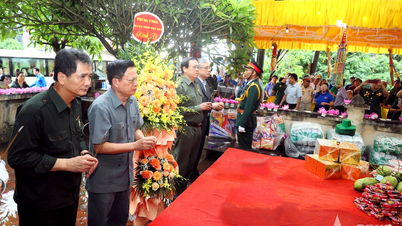
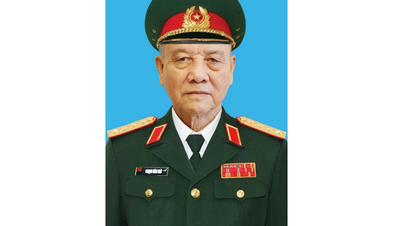





















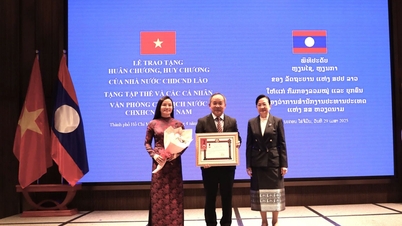










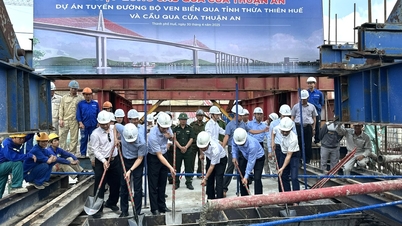















Comment (0)